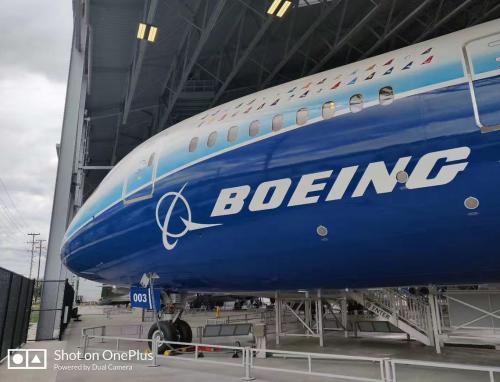Major Power Relations
Your Present Location: PROGRAMS> Major Power RelationsBoeing crisis will not be a barrier in Sino-U.S. deal
Source: CGTN Published: 2019-3-21
The eighth round of Sino-U.S. high-level trade consultation talk is expected to be held in Beijing on March 28-29. A U.S. delegation led by U.S. Trade Representative Robert Lighthizer will fly to China to further discuss trade issues with the Chinese side. Chinese Vice Premier Liu He has been invited to the U.S. for the ninth round of talks in early April, said Chinese Ministry of Commerce spokesperson Gao Feng on Thursday.
However, some Western media doubt that the crisis of Boeing will be a "hiccup" in Sino-U.S. trade talk. Bloomberg reported that China would exclude the purchase of Boeing's troubled 737 Max jet from the shopping list which China planned to buy from the U.S.
An article published on NBC further analyzed that Boeing aircraft play an important role in reducing U.S. trade deficit with China. Therefore, the Sino-U.S. trade negotiations may result in a deadlock over this issue.
He Weiwen, a senior fellow at the Chongyang Institute for Financial Studies at the Renmin University of China, pointed out that the Boeing's crisis is a matter of safety for the public which has nothing to do with the trade talks. Being the first country to ground all Boeing 737 Max 8 planes, China's position is very firm. The government will not purchase the Boeing 737 Max 8 jet if it has safety issues.
He also indicated that this will not affect the consultation between China and the U.S., because the Boeing 737 Max 8 issue is a U.S.' problem, not China's. The U.S. should offer other products. The Boeing planes are not the only options for reducing the trade deficit between the two countries.
When talking about the upcoming trade talk, he stated that it is still too early to predict whether a deal will be reached, but what is certain is that both sides have made concerted efforts and showed their willingness to end the trade dispute.
China has taken solid moves in lowering import tariffs. In 2018 alone, China has lowered tariffs on imported goods for four times including cuts on medicine, automobiles and auto parts, 1,449 daily necessities and industrial products.
Chinese Vice Commerce Minister Wang Shouwen stated earlier that in 2015, China's trade-weighted average tariff was reduced to 4.4 percent, fairly close to 2.4 percent of the United States and three percent of the European Union.
Also, China passed its foreign investment law in this year's Two Sessions, which promised a fair field for both Chinese and foreign firms and strictly prohibited forced technology transfer.

Series of measures taken by the Chinese government underscores the country's determination of further opening-up, and reflect China's determination to keep its promise. The U.S. as one of the most important trade partners of China is and will continue to benefit from China's opening market as long as it keeps supporting multilateralism which is the driving force for global economic growth.
According to He, a trade deal with China is also what the U.S. needs. The United States is realizing that the trade war is casting a shadow over its own economy.
Trump's extension of the tariff hike deadline can somehow reflect that. Trump pushed the deadline for a tariff increase to March 1 from January 1 as the result of a "90-day truce" reached with President Xi at the G20 Summit. He then delayed the March 1 deadline citing the trade talk's progress.
He stated that it is important for China and the U.S. to reach a deal. But what's more important is that the two countries reach a "good deal," a deal that is fair for both sides.
"China wants a deal in line with China's core interests which will not violate China's sovereignty or interfere in China's development. A deal in line with WTO rules and safeguard the multilateralism. The U.S. wants a deal that can reduce barriers for U.S. products, and more U.S. firms are able to enter Chinese markets," added He.
He Weiwen is a senior fellow of Chongyang Institute for Financial Studies at Renmin University of China.























































































 京公网安备 11010802037854号
京公网安备 11010802037854号





